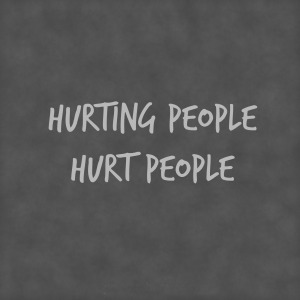My mom taught me compassion. She lived it in a very real way – sometimes TOO real. She couldn’t hear the sad story of someone’s misfortune without crying, and she would often do whatever it took, at almost any cost, to help them. There were days when we only had enough food in the house for that night’s supper, and she’d give it to someone else. Or when she’d give our last jersey away just before winter set in. No matter that we were now left with none – she was always convinced that their need was greater, that we had abundantly more than we needed, that the balance would be supplied.
And to her credit, she was usually right. We didn’t ever starve. I don’t know how she did it, but we always ate. We didn’t ever freeze. We did get cold, and for a very long time I hated winter bitterly with all it’s cold and no way on earth to get warm.
But here I am, three decades later, still alive, far from emaciated, and more than warm enough. We always had enough and, specifically, we always had enough to share – even when it seemed like we didn’t.

“Hurting people hurt people,” my mom taught us. People don’t behave poorly when they are loved and cared for. So the child who beat us up and pushed us down the highest school embankment? His parents were getting divorced and his wheat allergy was impairing his judgment. The girl who said I was a nerd and stole my stationery? No one had ever encouraged her to grow her mind or be anything but a pretty little doll, and she felt inferior.
We learned early on to see that the people who most need love usually show their need in the least loving ways possible. And while natural introversion may have kept us from embracing every lost soul we ever met, we certainly always looked on them with compassion, and without judgment.
I knew we weren’t like other families. I knew most of the kids in my class had jerseys – plural – plenty of them. And that they didn’t give them away, even when they’d outgrown them, unless it was to a younger member of the family. Or the maid. Fair enough. Each to his own, and all that. Perhaps they had fewer opportunities. People seemed to find my mom, as if she had some kind of homing beacon attached to her. Whether we were at school, at home, or at the grocery store, they found her. And no matter their age, gender, religion, or race, she helped them.
No, other people were not like us.
What I didn’t know then, though, was that other people don’t seem to teach compassion at all.
It starts with the little things. They tease members of the family who are in pain – whether it’s the toddler tripping over his own first steps, or the brand new teen nursing her first heartbreak. Whether it’s the earth-shattering drama of a tween playground fight, or a desperate yearning for a toy or tool that seems ludicrous to the other members of the family.
They’re not taught to realise that the pain that person feels is all-consuming, even if it seems insignificant to bystanders. A person who has never had any pain so great as a paper cut will feel that paper cut as the most devastating amputation. It doesn’t matter that it’s “just a paper cut” – to the sufferer it is, quite literally, the worst thing that has ever happened to him. But in some families, that person is mocked for their pain, and left to nurse it in their own personal hell.
So when they’re out there, in the big wide everywhere, they have no frame of reference for understanding the behaviour of that irritating, annoying child who doesn’t behave like the others. That person who tries to get people’s attention with silly jokes and random acts of petty vandalism. They don’t have the capacity to see that this behaviour belies a deep inner pain, and that all he or she wants is to be seen – heard – loved – no matter the baggage they bring with them.
Isn’t that what we all want?
But no one has told anyone this truth, and perhaps it’s because they just don’t know. So the annoying person is shunned, ostracised, ridiculed, ignored. They’re left feeling alone and misunderstood. They become reclusive, or their experiences lead them to act out in worse ways.
I didn’t grasp until recently that some kids are just never taught compassion. They’re never taught to try to understand WHY people behave in ways we might not like, and how we can help.
I am so grateful that my mom taught me that lesson. And I am so grateful that my daughters have learned it, too. I wonder how we can share it with everyone else.
Related: 15 ways hurting people hurt people – Recognise any of these? Maybe the person hurting you is deeply hurt themselves.